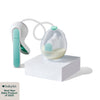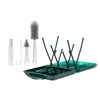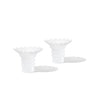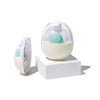Easy, accessible ways to manage your mental health in the fourth trimester and beyond.
As a human being, it’s impossible to completely avoid anxiety; physiologically, it keeps us safe. And during those first weeks and months after childbirth, new moms are bound to encounter some degree of anxiety.
Regardless of where you are in your postpartum journey, there are many ways to elevate your mood. Many of them are easy, and don’t require gym memberships or special tools.
Here are some of our favorite ways to nip those feelings in the bud, seek some relaxation, and involve others when it feels needed.
Try meditation
Meditation is a science-backed way to reduce stress and improve your well-being, and it’s easy to integrate into a daily routine—even one that feels like a moving target during these postpartum days. You might worry that you won’t be able to tune out your racing mind, but meditation is really about creating a deeper connection between your mind and body. It may sound esoteric, but you can feel calmer by meditating just a few minutes a day.
Consider CBT
Cognitive behavioral therapy (CBT) are exercises you can do on your own time to help you identify - and challenge - thoughts that prompt stress or low mood. It’s one of the most effective ways to manage your mental health and can be as simple as identifying negative thoughts, challenging negative thoughts, and then restructuring those thoughts by reframing them into more helpful or realistic ones. Journaling is an excellent and free way to identify unhelpful thoughts and what might be prompting them, and practices like reading self-help books can also work really well for applying clinical concepts to your own life. Canopie’s app guides you through a personalized, gestational-age based CBT program proven to boost mood and relieve anxious thoughts.
Move your body
One very easy way to deal with anxious feelings is to literally move them through your body. A study found that for postpartum women, exercise “can be an essential factor in the prevention of depressive disorders.”
During your first few postpartum weeks, you likely will be cleared for walking—and nothing more strenuous. Walking is one of the best things you can do to keep you present and rooted in your body while you are recuperating. But other types of movement are also good. On days when you don’t have a lot of time to exercise, dancing in the kitchen (with or without your baby, with or without your favorite song) is a good option.
Get outdoors
Many women feel so isolated during the early part of motherhood that getting outside, even if it’s just for 5 to 10 minutes, or to walk to the mailbox and back, can reduce anxiety. If the weather is welcoming, take your movement outside, and get some “green exercise.” A review of studies found that when compared with exercising indoors, green exercise “was associated with greater feelings of revitalization and positive engagement; decreases in tension, confusion, anger, and depression; and increased energy.”
Eat something nourishing
Whether it’s a smoothie full of greens, berries, and plant-based powder, or a quick snack of protein and carbohydrates—cheese and crackers, peanut butter on an apple—these foods are important for your healing. And guess what? Dark chocolate can help. It’s a food whose sweetness and richness brings you right into the present moment. Research suggests that chocolate with 85 percent cacao can help elevate your mood just by eating it—and it’s good for your gut, to boot.
Breathe deeply
The key to quick relaxation is to gain control over your breath. Try one of these two simple ways:
Start with something called square breathing. Inhale and count to four, and then gently hold the breath for a count of four. Exhale to a count of four, and then hold the exhale for a count of four. Repeat as often as necessary, until you feel calmer. This process helps balance the nervous system.
Don’t want to hold your breath? Another easy way to invite the body’s relaxation response is to make your exhalation longer than the inhalation. Visualize inhaling all good things (relaxation, joy, calmness) while counting to four, and exhale out the negative stuff (stress, confusion, anxiety) to the count of six. Gradually work up to the count of eight so that your exhalation is twice the length of the inhalation.
Get some rest
We all know how important sleep is. But if you’re having trouble calming down, or you’re anxious about your baby, or you’re tired-but-wired, sleep can feel impossible. If napping while the baby sleeps is out of the question, don’t feel bad. You’re not alone. Instead, rest when you can—even if it means just lying down for a little bit on the couch or in your bed, with a blanket and the lights dimmed. You may or may not fall asleep, but the point is to stop doing and just be.
Call on your partner
If you have a partner, you are both tired and are sharing a lot of responsibilities, but without a doubt, extra tasks tend to fall upon the mom. You’ve also just been through childbirth—and recovery takes time! You’ll need some extra support, but you might not even know what you need, or you might feel awkward asking for it.
Ask your partner for help with finding the right therapist, or to set healthy boundaries, if you’re struggling and trying to do too much. Or maybe you need some verbal support—a pep talk about the good job you’re doing, acknowledgement that what is happening is really challenging, or assurance that your partner is wholeheartedly there for you.
Lean on your community
Community support can make a huge difference in your recovery. Beyond working with your partner, your family and/or friends can help you take care of the baby—or take care of you. That might mean watching your baby while you take a shower, or bringing you dinner once a week.
Being geographically separated from your extended family can add more stress. This could mean that you’re missing your mom’s favorite comfort food, or missing an aspect of your cultural background’s unique way of welcoming babies into the world—and moms into motherhood.
Cultural care traditions—from visiting aunties to rotating overnight grandmother caretakers—can increase support and offer early intervention for potential challenges. Being meaningfully connected to your community brings a reduced risk of depression.
Hire outside help
If you feel like you need it, and you can afford it, you can hire professional support for you and your newborn. You may be familiar with birth doulas; there are also postpartum doulas. Or maybe you’d prefer a baby nurse to help take care of your baby overnight so you and your partner can get more rest. (Ask your pediatrician, obstetrician, or mom friends about baby nurses, also known as night nurses or night doulas. They tend to be referred by word of mouth, though some are listed in the Postpartum Support International directory.) Finally, you could consider a part- or full-time nanny, or even live-in help, such as an au pair.
It can be hard to know ahead of time whether you think you’ll need help after your baby arrives, but if you need extra support (maybe your family lives far away, or you have client work to attend to, or you have multiple children on different schedules), hiring outside help can be a real boon, if not something that feels like a life-saving investment. Consider asking for professional services as a gift from friends or family who have expressed a desire to help you but are unable to lend a hand in person.










